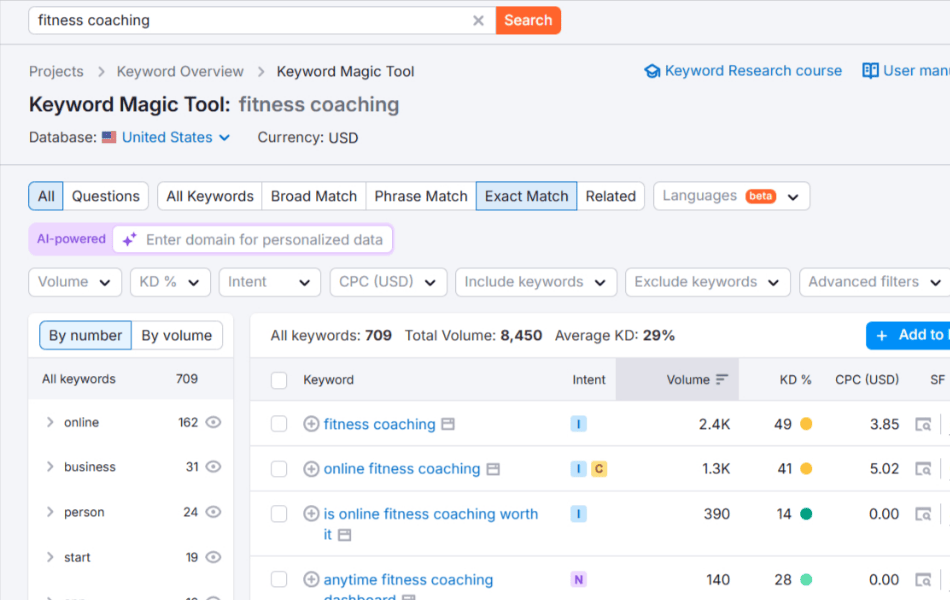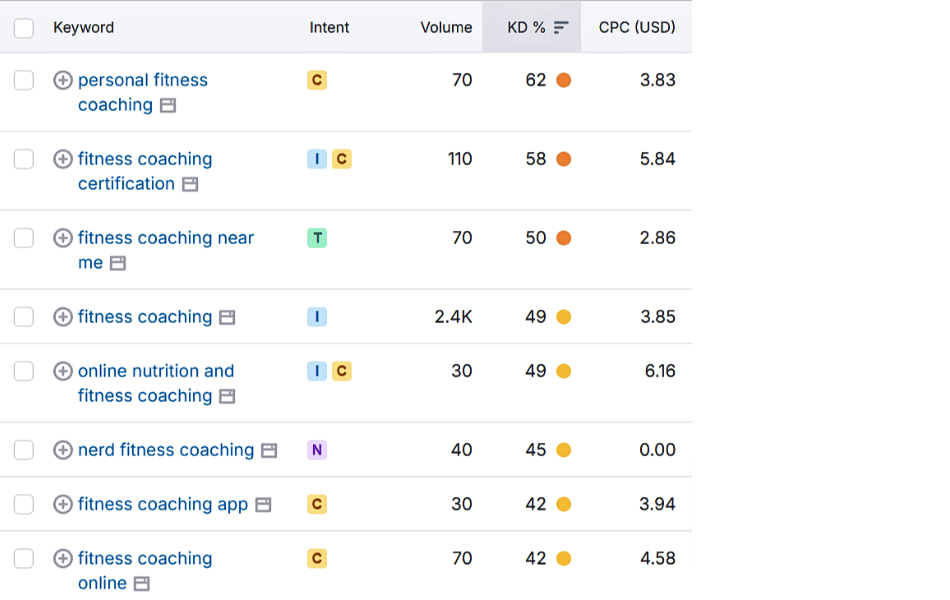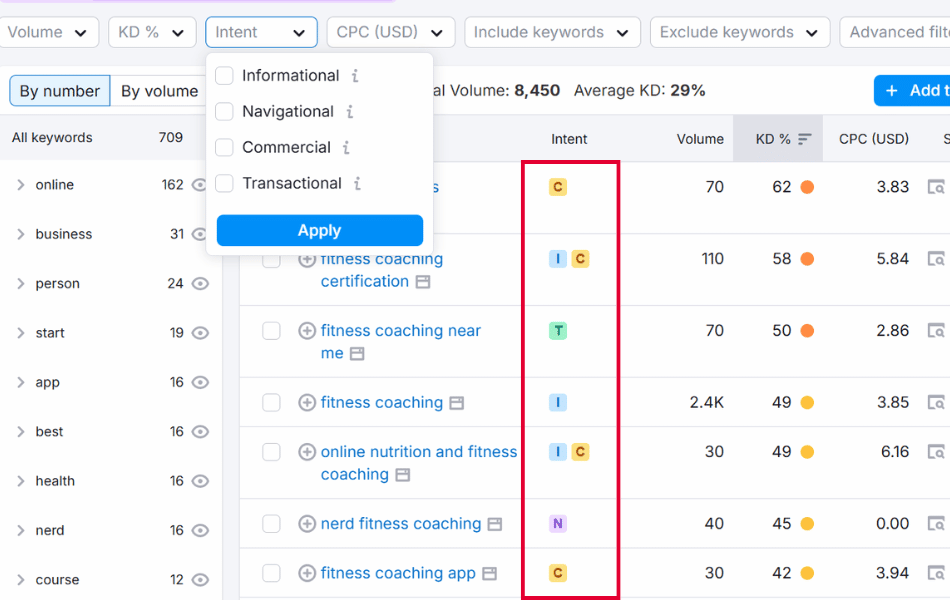Learn how I used the same steps to increase online visibility.


Table of Contents
Key Highlights
- Keyword research is the foundation of successful digital marketing for small businesses.
- The right keywords can boost your online visibility, drive traffic to your website, and attract potential customers.
- Understanding search intent is crucial for choosing relevant keywords that match what your audience is searching for.
- Effective keyword research involves using a combination of tools and techniques, from brainstorming and competitor analysis to utilizing keyword research tools.
- This blog post provides a step-by-step guide to help small businesses master keyword research and enhance their online presence.
Introduction
In today’s digital world, having a strong online presence is key for small business success. Many businesses are competing for attention online, and it can be hard to stand out.
That’s why keyword research is very important.
- Helps guide your digital marketing efforts.
- Ensures that your small business is seen by the right people at the right time.
- Improve your online visibility.
Understanding the Importance of Keyword Research
It is the foundation of your digital marketing plan. You do not just go finding popular words in your industry. You would need to identify the specific terms your potential clients use when searching for products or services similar to yours.
Understanding these search habits, and using tools like Google Search Console to monitor keyword performance:
- Gives you insight into your target audience’s desires and challenges.
- Helping you create content that addresses their needs effectively.
This strong understanding helps you build marketing campaigns that connect well with your audience. In return, brings more ready-to-buy visitors to your website and raises your sales.
1. What is keyword research?
At its core, it is about finding the right words people use in search engines like Google. These terms are what they type when looking for information, products, or services.
For example, someone looking for a new coffee maker might type “best coffee maker 2024” or “top-rated espresso machines. Understanding the language your audience uses and aligning your content with their searches is crucial.
By finding targeted keywords, you can stay updated on current trends, see search volume, and analyze competition. They act as the bridge between your business and potential clients on SERPs.
The main goal of keyword research is to find a balance between:
- Relevance.
- Search volume.
- Competition.
Using the right keywords helps search engines understand your content and connects you with users actively seeking what you offer.
2. The Role of Keywords in Digital Marketing
In digital marketing, targeted keywords are crucial for guiding potential customers to your online presence. Using them in your website content, social media, and ads is essential for standing out and increasing visibility. (Source: Communicationmgmt)
Keywords are essential for your SEO strategy, influencing your organic search results and informing search engines about your products and services.
They play a crucial role in:
- Paid ads.
- Social media marketing.
- Content marketing.
- Targeting your audience effectively.
3. How Keyword Research Impacts Your Business Visibility

How easy it is for people to find your business online greatly affects your visibility. It impacts where you appear on search results pages (SERPs).
The better your ranking for relevant search terms, the more likely people will find your website. This means more traffic and better brand exposure.
Remember:
- It’s not just about being high on rankings.
- It’s about reaching the right audience.
- Understand search purpose and find keywords that match what your audience wants.
- You need to attract the right visitors who are likely to become paying customers.
In short, good keyword research leads to a stronger and more noticeable online presence. It helps you stand out and places your business in front of ideal customers who are looking for the solutions you provide.
Step-by-Step Guide to Effective Keyword Research
Starting keyword research doesn’t have to be hard. You can break it down into easy steps.
This will help you create a strong strategy. The steps below will help you with your research.
Keep in mind that keyword research is not just a one-time job. It keeps changing with your business, your audience, and the digital world. Start by building a strong base.
Step 1: Identifying Your Core Topics
The first step in any good keyword research journey is to look at the bigger picture.
Think about the main products or services your business offers.
- What are the key themes and subjects in your business and industry?
- Start by making a list of broad topics related to what you provide.
- Don’t stress about getting too detailed now; your goal is to build a general framework.
- For example, if you operate an online clothing store, your main topics could be “women’s clothing,” “men’s clothing,” “accessories,” or specific items like “shoes,” “dresses,” or “jeans.”
- After you have your primary topics list, start to expand.
- Look at related subtopics and specific keyword ideas in each group.
- This brainstorming session is the base of your research.
It will help you focus and find key areas to explore next.
Step 2: Generating a List of Seed Keywords
With your list of main topics ready, it’s time to create seed keywords.
- Start by generating a list of keywords that are closely tied to your core topics.
- Think of these seed words as the first step in building your keyword strategy.
- They connect directly to your business, products, and services.
- For instance, if one of your main topics is “women’s shoes,” you could use seed keywords like “women’s sneakers,” “high heels,” “women’s boots,” or “women’s sandals.”
- Try to think of different terms, mixing both general and specific keywords.
This list of seed keywords will be the foundation of your research. It will help you find related terms, variations, and long-tail keywords. These longer phrases are what people usually search for.
Step 3: Using Tools to Expand Your Keyword List

Brainstorming is a great way to start. However, it is important to use keyword research tools to grow your list. A keyword tool looks at search data. It gives key information about search volume, competition, and related keyword ideas.
There are many keyword research tools out there. Some are free, and others you have to pay for. These tools can really help with your research.
You can use free keyword planner tools such as:
- Google Keyword Planner
- Ubersuggest or
- Try more advanced software like SEMrush or Ahrefs.
They often include features like:
- Keyword Suggestions:
- Enter your main keywords to get a list of related keywords and different variations.
- Search Volume Data:
- Find out how often a keyword is searched each month.
- This helps you pick the top keywords with the most traffic.
- Competition Analysis:
- Understand how tough it is to rank for a keyword.
- This shows whether it will be hard to move up in search results for that term.
You can learn more and find valuable keywords that you might not find on your own, using these tools.
Step 4: Analyzing Keyword Difficulty and Search Volume
Not all keywords are the same. It is important to understand keyword difficulty and search volume for good research. Keywords with high search volume might look attractive. However, these keywords are often highly competitive. This makes it hard for new websites to rank well without paying for ads.
For example, look at this search result of “fitness coaching” with search volume of 2.4k/m and keyword difficulty of 49. This is a highly competitive keyword that is very hard for a new site to rank.

Keyword difficulty shows how much work is needed to rank high for a keyword.
It looks at several things:
- The strength of other websites.
- Their backlinks.
- The quality of their content.
The goal is to find a good balance.
- You should look for keywords that have a good search volume.
- You must think about the competition.
- Focus on less competitive keywords.
- That are with keyword difficulties of 20 and below, if your site is just starting up can be a smarter plan.
This can help you grow your website’s authority over time.
You can read all about keyword difficulty from Search Engine Land.
Step 5: Understanding User Intent Behind Keywords

To make content that connects with your target audience and ranks high in search results, you need more than just targeted keywords. You must understand the search purpose behind them.
Search intent is:
- Why someone is looking for something online.
- They could be searching for information, a product, a local business, or they might be ready to buy.
- Search intents are categorized under Informational, Navigational, Commercial and Transactional.
Knowing this intent is key to creating content that meets their needs.
For instance, if someone types in “best running shoes for plantar fasciitis,” they want help for a specific foot issue.
- If you target this keyword with basic content about running shoes, it won’t be helpful.
- You should focus on user intent by offering useful information and product suggestions that are specific to what they need.
Step 6: Selecting the Right Keywords for Your Campaigns
Now that you have your list, it’s time to pick the best ones for your campaigns.
- Pay close attention to how they match your business.
- Their search volume and competition.
- What people intents are, when they search for these terms.
Think about your SEO strategy and what you want to achieve.
Do you want to bring in:
- More visitors?
- Get leads?
- Boost sales?
Your choice of keywords should fit these goals. This way, you can draw the right audience to your website.
Group them into categories based on themes, products, or where a buyer is in their journey. This will help you make content that is focused and improve your website’s layout for better visibility.
Leveraging Keyword Research for SEO Success
Effective keyword research is the foundation of a good SEO strategy. It helps you understand how to improve your website content.
Using tools like Google Ads:
- Can further support your keyword planning efforts.
- Make it easier to bring in organic traffic.
- Beat your competitors in search results pages (SERPs).
Carefully use appropriate keywords in your website’s content, meta descriptions, headings, and image alt tags to enhance search engine visibility. Avoid keyword stuffing as it can negatively impact your SEO.
1. Optimizing Your Website’s Content with Keywords
Optimizing existing content is crucial.
- Review your web pages, incorporate keywords naturally in the content, headings, and meta descriptions.
- Prioritize user experience.
- Maintain a balance between search engine requirements and reader preferences to enhance your website’s relevance and organic search ranking.
2. Building Backlinks with Targeted Keyword Anchors
Backlinks are links from trusted websites that point to your site. They are important for search engine optimization.
Backlinks show search engines that your website is a reliable source of information.
When creating backlinks:
- Use targeted keyword anchors for better SEO.
- The anchor text is visible in the hyperlink and helps search engines understand your content.
- Targeted keywords in your anchor text signal search engines about your website’s relevance to those keywords.
For instance, if you have a guide on “how to choose the perfect wedding dress,” having other websites link to it with anchor text like “wedding dress guide” or “choosing a wedding dress” can help your website rank better for them.
Utilizing Keywords for Enhanced Content Marketing
Keyword research is a key tool for your content marketing strategy. When you know what your target audience is looking for, you can make content that connects with them.
This can be an informative blog post, exciting content for social media, or engaging videos.
Adding appropriate keywords can boost your visibility. It helps bring more people to your content and shows that you are a leader in your field.
1. Creating Keyword-Rich Blog Posts and Articles
A great blog post can help drive people to your website and connect with your target audience. But, even the best blog will struggle to get noticed without using the right keywords.
- Find valuable keywords that match your blog topic and have good search volume.
- Use them in your content. This includes the title, headings, body text, and meta description.
- Always aim to write for your readers first and search engines second.
- Focus on making high-quality and engaging content.
A blog post that offers real value is likely to be shared and linked, helping it to rank higher on search engines.
2.Developing a Content Calendar Based on Keyword Research
A content calendar is an invaluable tool for your content strategy. It helps you stay organized and maintaining consistency with your content marketing efforts.
Leveraging your keyword research, can help you create a content calendar that is not only organized but also strategically aligned with your target audience’s search behavior.
- Start by identifying key themes and topics that emerged from your research.
- Create content pillars around these themes.
- Brainstorm specific blog post ideas, article topics, or even video scripts based on relevant keywords within each pillar.
Content Pillar Example | Relevant Keywords | Content Ideas |
Women’s Fashion | Summer dresses, maxi dresses, floral print dresses, casual dresses | – Top 10 Summer Dresses for Every Occasion – Style Guide: How to Accessorize a Maxi Dress – Finding the Perfect Floral Print Dress for Your Body Type |
Advanced Techniques in Keyword Research
Using advanced methods can help you find useful insights. This can give you a better chance against others.
Two important strategies:
- Long-tail keywords
- Looking at your competitors.
These can greatly help with your SEO and content marketing.
These techniques help you improve your keyword strategy. They can reveal new chances and let you focus on specific audiences clearly.
By learning and using these methods, you can have a strong advantage in the changing online search world.
1. Exploring Long-Tail Keywords for Niche Targeting
While short-tail keywords are usually shorter and more general.
Long-tail keywords are longer and more specific phrases.
- People use them when they are searching for something particular.
- They may have a lower search volume on their own, but together they make up a big part of online searches.
- Long-tail keywords are great for targeting niche markets.
- They bring in a specific audience who is actively searching for what you provide.
For instance, instead of using the common keyword “leather jacket,” you could use a long-tail keyword like “distressed brown leather jacket with fringe for women.” This targets a more specific audience.
When you add relevant long-tail keywords to your website content and marketing, you can get high-quality visitors. This help increase your conversions and improve your ranking for specific search queries.
2. Competitor Keyword Analysis for Strategic Insights
Keeping track of your competitors is important in the online world. Competitor keyword analysis means looking into the keywords that your competitors rank for.
This helps you find ways to beat them.
- Look at their keyword strategies and discover your weak points in your own plan.
- You can also find valuable keywords that you may have missed.
- You will learn more about their strong and weak sides in search engine results.
There are many tools that can help you analyze competitors, such as SEMrush, Ahrefs, Moz, SpyFu, Ubersuggest, SimilarWeb, Serpstat, BuzzSumo, Majestic, and even Google Search Console for benchmarking your own performance.
These tools provide information about their top-ranking keywords, estimated organic traffic, and backlink profiles. With this information, you can make better choices for your own keyword targeting, content creation, and SEO strategies.
Conclusion – Keyword research for small business success online
In conclusion, knowing how to research keywords is very important for small business success online.
By finding the right keywords, figuring out what people want, and improving your content, you can greatly increase your business visibility and draw in the right visitors.
Keep checking and updating your strategy to stay up-to-date and ahead of the competition. Use short-tail and long-tail keywords in smart ways.
Also, look at what your competitors are using. It’s important to create valuable content that includes these keywords regularly to improve your SEO efforts.
Follow these helpful tips to make keyword research work for you and help your small business grow and succeed.
FAQs
Can I Do Keyword Research Without Paid Tools?
Yes, there are many free tools. Google Trends and Google Keyword Planner are a couple of them. You can use these tools to do basic keyword research for small business SEO.
How Often Should I Review and Update My Keyword Strategy?
It’s a good idea to check and change your strategy every few months. You should also do this if you see big changes in search results, website traffic, or how future customers act. Google Analytics can help you watch these changes.
What’s the Difference Between Short-Tail and Long-Tail Keywords?
Short-tail keywords are short and general words that many people search for. They have high search volume but cover a wide range of topics. Long-tail keywords, however, are longer and more specific phrases. They have lower search volume but show a clearer search intent. This makes long-tail keywords great for reaching a specific audience.
